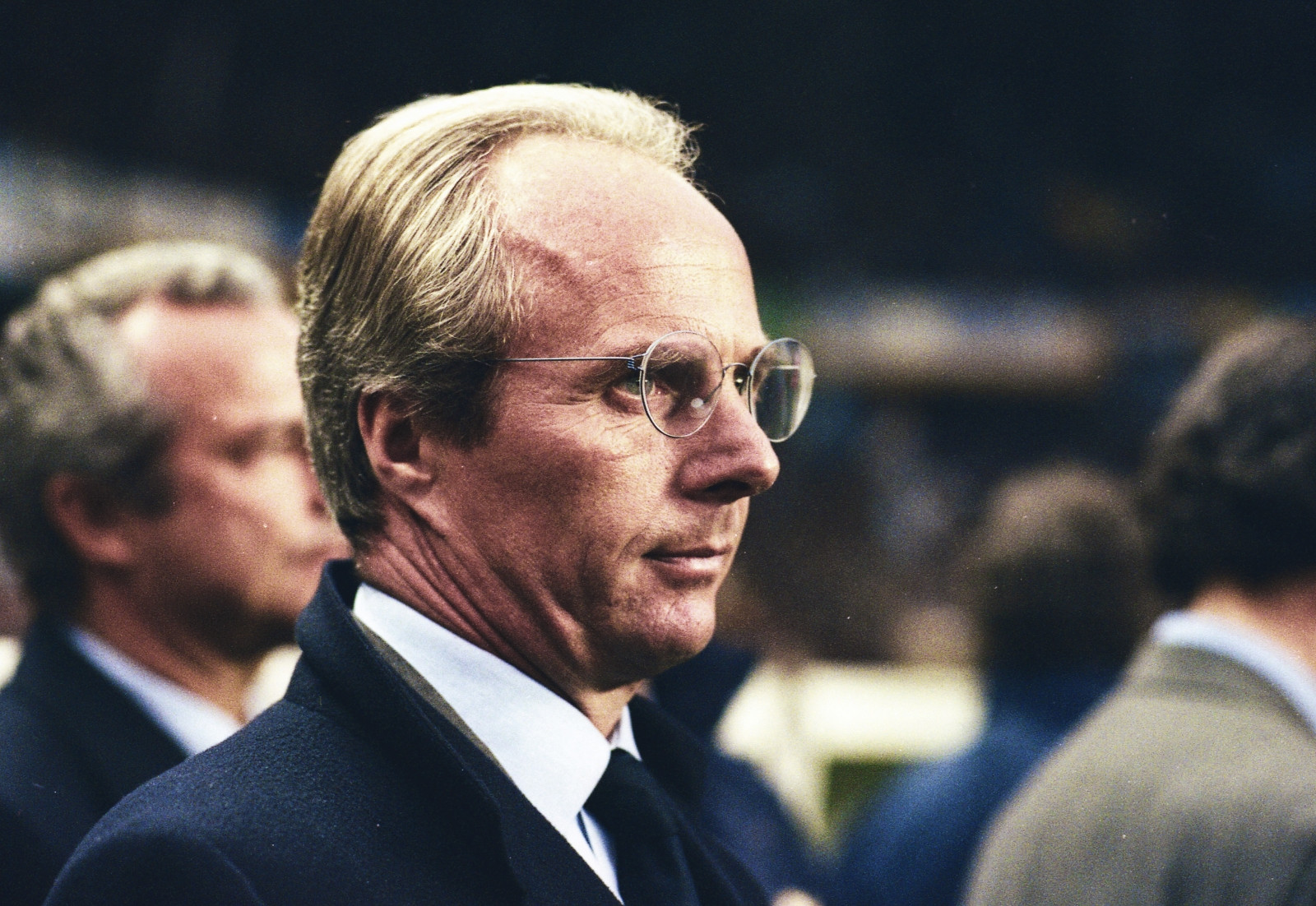Sven-Göran Eriksson, the first foreign manager of England's men's national team, has died. He was 76.
Eriksson revealed in January that he had been diagnosed with terminal pancreatic cancer.
A family statement shared by Eriksson's former agent, Bo Gustavsson, said the Swede passed away at his home on Monday surrounded by his loved ones.
Eriksson made one final appearance in the dugout on March, when the boyhood Liverpool fan joined the management team for the Liverpool legends charity match against Ajax. The home side won 4-2.
He managed Liverpool Legends in a charity match against Ajax Legends, overseeing a 4-2 win for his team. He said afterwards he had shed tears before kick-off, when he received a standing ovation from the crowd as he walked out onto the pitch, with fans singing the Liverpool anthem of ‘You’ll Never Walk Alone’.
“That will be a huge memory in life,” Eriksson said. “Absolutely beautiful.”
Eriksson had an unremarkable playing career in his native Sweden before becoming Tord Grip's assistant at Degerfors. Eriksson became head coach when Grip left to take over at Sweden and led the club to promotion.
His success at Degerfors caught the attention of AFK Goteborg in the top tier of Swedish football where he won the UEFA Cup in 1982 -- the first team from the country to win the competition.
Eriksson was then appointed by Benfica who led to the Portuguese league title in his first season in charge.
Following a second consecutive title triumph in 1983-84, the Swede began a 16-year spell during which he managed four Serie A clubs.
He found most success with Lazio, where he secured his reputation as one of Europe's leading coaches by winning Serie A in 2000 -- the second Italian championship in the club's history -- and three other major trophies.
Eriksson became the first non-British manager to be appointed coach of the England national team following Kevin Keegan's shock resignation after his team were beaten by Germany in the final match played at the old Wembley Stadium.
The Swedish coach reinvigorated England's faltering World Cup qualification campaign, which included a memorable 5-1 win over Germany in Munich and a dramatic draw against Greece that secured the country's place in the 2002 tournament.
England were knocked out at the quarterfinal stage by Brazil after Ronaldinho's free kick gave the eventual tournament winners a 2-1 victory in Japan.
More quarterfinal heartbreak followed at Euro 2004 and the 2006 World Cup where, despite being considered among the pre-tournament favourites, England lost on penalties to Portugal on both occasions.
“This is a very sad day,” the English Football Association's (FA) CEO Mark Bullingham said in a statement on Monday. “He gave all England fans such special memories. No one can ever forget the 5-1 victory in Munich against Germany under Sven’s guidance.
“Sven will be rightly recognised and forever remembered for his significant work with the England team, and for his wider contribution to the game.”
Bullingham also confirmed that England would pay tribute to Eriksson at their game against Finland in September.
Eriksson left his role after the 2006 World Cup, spending a year out of the game before taking over at Manchester City. Eriksson spent one season in charge at the Etihad after his team struggled to maintain their good form in the early months of the campaign as they eventually finished ninth in the Premier League.
Spells in charge of Mexico, Notts County, Ivory Coast, Leicester City and China followed before Eriksson's coaching career came to an end following his four-month stint as Philippines manager.
After taking over from Stuart Pearce, Eriksson oversaw the arrival of an influx of continental talent as City made a flying start to the campaign.
He led the Blues to their first league double over Manchester United in 38 years as we finished ninth in the Premier League.
Eriksson was born in 1948 and played for several clubs in his native Sweden before retiring through injury at the age of 27.
But it was a manager that he excelled with a hugely successful coaching career with clubs in Sweden, Portugal and Italy before becoming the England national team boss between 2000 and 2006.
He took over at the Etihad Stadium in the summer of 2007 and following his exit at the end of the season, he remained involved in football until earlier this year.
The thoughts of everyone at Manchester City are with Sven’s family and friends.
Flags around the Etihad Stadium will fly at half mast in honour of our former manager.
Swedish football manager Sven-Goran Eriksson, who coached England’s team from 2001 to 2006, has died at the age of 76 after a battle with pancreatic cancer.
Eriksson became the first foreigner to lead the England national team – and also led Swedish, Portuguese and Italian clubs to major trophies in the 1980s and 1990s before taking on the England job in 2001.
The charismatic manager announced in January that he was terminally ill with pancreatic cancer.
Eriksson’s longtime agent Bo Gustavsson said Eriksson had lost his battle with cancer early on Monday, surrounded by his family.
“We knew it was going to end bad, it all went really fast in the last few weeks,” said Gustavsson.
“I have been fascinated by him for a long time. He has always been so positive and has had time for others and never thought of himself, and he was that until the very end,” the agent added.
Eriksson led England to the quarterfinals of the 2002 and 2006 World Cups, and to the 2004 European Championship, managing a golden generation of players, including David Beckham, Paul Scholes, Frank Lampard, Wayne Rooney and Steven Gerrard.
We are deeply saddened that Sven-Göran Eriksson, who managed the #ThreeLions from 2001 to 2006, has passed away aged 76.
Our thoughts are with his family and friends at this time.
Rest in peace, Sven. You will be greatly missed ❤️ pic.twitter.com/aLtqWAG8K4
— England (@England) August 26, 2024
In his native Sweden, where he is known simply as “Svennis”, Eriksson was praised as a great sports leader.
In January, he told public broadcaster Sveriges Radio that his doctor’s assessment was that he had “at best maybe a year [to live], at worst a little less”.
“We have known about this. but it happened very quickly. We were not prepared for it to happen today,” Gustavsson told AFP news agency.
Born February 5, 1948 in Sunne in western Sweden, Eriksson found success as a football manager after retiring from a modest career as a defender.
In 1977, he became manager of the Swedish club Degerfors IF. After leading the small club to success in lower divisions, he attracted the attention of bigger clubs.
He went on to manage Sweden’s IFK Goteborg before finding success internationally, managing Benfica in Portugal, as well as several Italian teams including Roma and Lazio.
His most high-profile position was as the first foreigner to manage England’s national squad, which he left in 2006 after five years in charge.
Eriksson then went on to manage the teams of Mexico, Ivory Coast and the Philippines, but never his native Sweden’s national squad.
England’s Prince William, who is the president of the English Football Association, led the tributes to Eriksson, calling him a “true gentleman”.
“Sad to hear about the passing of Sven-Goran Eriksson. I met him several times as England manager and was always struck by his charisma and passion for the game,” he wrote on X.
“My thoughts are with his family and friends. A true gentleman of the game.”
Sad to hear about the passing of Sven-Goran Eriksson. I met him several times as England manager and was always struck by his charisma and passion for the game. My thoughts are with his family and friends. A true gentleman of the game. W
— The Prince and Princess of Wales (@KensingtonRoyal) August 26, 2024
Although Eriksson was unable to end England’s wait for a first major trophy since the 1966 World Cup, his teams produced several memorable performances, including a 5-1 rout of Germany in a World Cup qualifier in 2001.
“This is a very sad day. He gave all England fans such special memories. No one can ever forget the 5-1 victory in Munich against Germany under Sven’s guidance,” FA CEO Mark Bullingham said.
Bullingham added: “Sven will be rightly recognised and forever remembered for his significant work with the England team, and for his wider contribution to the game.”
After stepping down from the England job in 2006, Eriksson managed Manchester City in the 2007-08 season and the Premier League club joined the tributes to their former boss.
“We would like to express our sincere condolences to the family and friends of Sven-Goran Eriksson, who has passed away at the age of 76. Rest in peace, Sven,” a City statement said.
We would like to express our sincere condolences to the family and friends of Sven-Goran Eriksson, who has passed away at the age of 76.
Rest in peace, Sven. 🩵
— Manchester City (@ManCity) August 26, 2024
Liverpool provided Eriksson with an emotional final football memory in March when they allowed him to fulfil a lifelong dream by managing them in a charity match at Anfield.
“Rest in peace, Sven-Goran Eriksson. The thoughts of everyone at the club are with Sven’s family and friends at this extremely sad time,” Liverpool said in a statement.
Eriksson was a title winner as the boss of Lazio and Benfica, also lifting the UEFA Cup and European Cup Winners’ Cup and reaching the European Cup final during a memorable career.
The Union of European Football Associations (UEFA) said: “On behalf of the European football community, everybody at UEFA is deeply saddened to learn of the passing of Sven-Goran Eriksson.”
On behalf of the European football community, everybody at UEFA is deeply saddened to learn of the passing of Sven Göran Eriksson.
A beloved figure in the game, Sven was a UEFA Cup winner as coach of IFK Göteborg in 1982 before leading Lazio to the UEFA Cup Winners’ Cup in 1999.… pic.twitter.com/ZlNSFftl97
— UEFA (@UEFA) August 26, 2024
The Legacy of a Football Legend
Eriksson's managerial career spanned over four decades, and he was widely regarded as one of the most successful coaches in the world. During his time as manager of England, he faced a constant barrage of criticism from the British media for his personal life and for the team's inability to win a major trophy. However, Eriksson remained true to his own code, never allowing the pressures of the job to affect his focus on the game.
Eriksson was a unique blend of charisma, professionalism, and an almost cartoonish knack for finding himself in trouble. He had a deep love for the game and always put the players first. His legacy will be that of a man who was loved by the players he coached and by fans around the world.
A Lasting Impact
Eriksson's impact on football goes beyond his success on the pitch. He was a pioneer who broke down barriers by becoming the first foreigner to manage England. He paved the way for other non-British managers to take charge of national teams, and his appointment was a sign of the changing face of football.
Eriksson's legacy will be that of a man who was loved by the players he coached and by fans around the world. He was a true gentleman of the game, and he will be dearly missed.

















